Grebel alumni are involved in many interesting initiatives that use technology for good—in start-ups, projects, support roles, research, and hobbies. The following profiles highlight some alumni who are involved in activities that use technology to make a difference in society and the world. We asked them to reflect on these questions: How are you making the world a better place using technology? How has this involvement changed you, challenged you, or enriched your life? Why are you driven in this direction? How did Grebel inspire this path?
JARED BARIBEAU (BASC 2018)
Systems Architect, Smartex.ai, Porto, Portugal
Currently I’m working at Smartex on tech that helps enable zero-waste textile manufacturing and supply chain traceability. A massive amount of resources are wasted throughout fashion supply chains, and brands (and we consumers) have nearly zero visibility into where the materials are coming from. This has left everyone’s hands partially tied.
I love connecting with nature, and feel deeply pulled to play a role in moving human consumption to be in harmony with what our beautiful planet has to offer. Working on this gets me thinking about how badly we need nations, industries, companies, and individuals to want to be in harmony with the planet. So, one of my favourite things to do is go camping—to inspire myself and others through quality time with nature.
Conversations and classes at Grebel dramatically broadened my mind on what activism can look like, and helped expose me to how change happens. I’ve been inspired by so many people I met through Grebel—and particularly through the Centre for Peace Advancement.
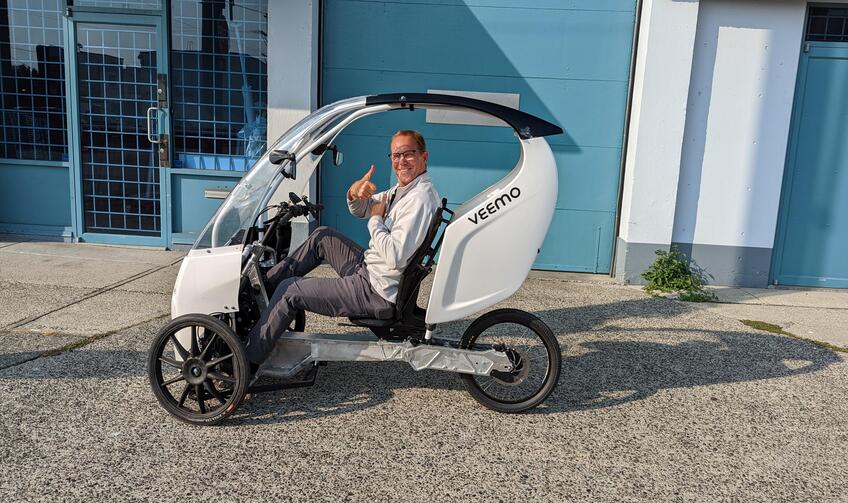
DALE BRUBACHER-CRESSMAN (BASC 1987)
Angel Investor, New Hamburg, ON
I invest in start-up companies. My investing focus is on companies with technologies and ideas that reduce humanity’s carbon footprint. This includes installation of solar generation (VCT Group, Community Energy Development Co-op), reducing energy consumption through intelligent monitoring (Power Takeoff), reducing vehicular traffic through sensors and software for remote control and collection of data (eleven-X, Miovision), and alternative electric powered transport vehicles (Veemo).
This focus comes from a desire to do good. The challenges are many and varied. Most notably, I find myself stretched in my knowledge of how to build a successful business. The businesses have overlapping challenges, but also many unique to their particular situation. There is no end of learning opportunities.
My upbringing in the Mennonite Church, extended into university life at Grebel, fostered in me a sense of responsibility and desire to make the world a better place. The opportunities at Grebel to be surrounded by like-minded people, coupled with an environment where the status quo was challenged and students were encouraged to think deeply about the challenges in society, all contributed to this aspiration.
GRACE WRIGHT (BA 2021)
Business Development Manager, GeoMate, Kitchener, ON
I work at GeoMate, a tech start-up with a mission to make mobility in cities more accessible for everyone. Using our technology, we are able to support more inclusive and safer forms of mobility for a variety of different stakeholders, from cities to automotive companies. As the business development manager, I help bring our technology to end-users, helping them find the solutions they need to support their products and customers.
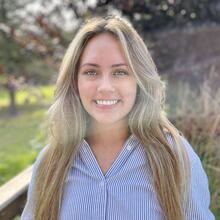 Working at a young start-up focused on tech for good has been a really gratifying experience for me because I can see the direct impact of our technology on creating healthier, safer, and more inclusive communities. Seeing the process of building a company from the early stages and meeting with many different people working across the mobility space has given me insight into the importance of incorporating different groups and perspectives to build better technologies that can have widespread positive social impact.
Working at a young start-up focused on tech for good has been a really gratifying experience for me because I can see the direct impact of our technology on creating healthier, safer, and more inclusive communities. Seeing the process of building a company from the early stages and meeting with many different people working across the mobility space has given me insight into the importance of incorporating different groups and perspectives to build better technologies that can have widespread positive social impact.
From working at the Centre for Peace Advancement, to helping lead the PeaceTech Living-Learning Community, working with Project Ploughshares, and now being a part of a start-up in the Grebel Peace Incubator, Grebel has played a central role in not only developing my understanding of how technology can be used as a tool for building peace, but giving me opportunities to put that into practice through my work. Grebel provided me with unique exposure to the interdisciplinary nature of bridging peacebuilding and technology and helped me develop a strong appreciation for how the two can work in tandem to create positive change.
KEVIN WILLMS (BCS 2012)
Senior Manager, Cloud Operations Reliability Engineering, D2L, Kitchener, ON
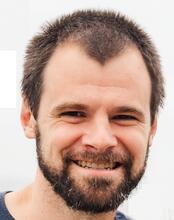 The most important feature of a product is availability. By iteratively identifying opportunities for improvement and overseeing the creation of automation to ensure our Brightspace Learning Management System is always functioning well for all users, I help ensure learners around the globe are able to get an education and access learning resources when they need them.
The most important feature of a product is availability. By iteratively identifying opportunities for improvement and overseeing the creation of automation to ensure our Brightspace Learning Management System is always functioning well for all users, I help ensure learners around the globe are able to get an education and access learning resources when they need them.
I’m definitely more sensitive to, yet empathetic about every day outages that happen everywhere, from the Super Bowl lights failing to traffic jams. I like solving problems that make people’s lives easier, and so caring about delivering a good customer experience makes my current role a great fit.
As a don at Grebel for three terms, making lives easier is the name of the game—whether that’s making sure everyone can sleep who wants to without ruining all the fun for those staying up late, or making sheet change fun by parodying songs and inserting sheetrelevant lyrics. That experience likely helped solidify my drive to create a great client experience.
NEIL BRUBACHER (BASC 2021)
MASC student in Systems Design Engineering, Vision and Image Processing Lab, Waterlo, ON
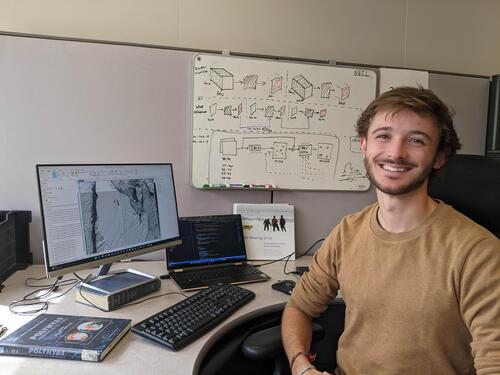 I’m researching ways in which machine learning can be used to automatically interpret satellite and aerial imagery, with applications in arctic sea ice mapping and marine mammal surveying. Part of my research is in collaboration with the Arctic Eider Society, an Inuit-driven charity that links Indigenous knowledge and technology to help build richer understandings of a changing climate, particularly as it affects sea ice and wildlife.
I’m researching ways in which machine learning can be used to automatically interpret satellite and aerial imagery, with applications in arctic sea ice mapping and marine mammal surveying. Part of my research is in collaboration with the Arctic Eider Society, an Inuit-driven charity that links Indigenous knowledge and technology to help build richer understandings of a changing climate, particularly as it affects sea ice and wildlife.
As much as I strove to choose a meaningful program of graduate study, I must admit my involvement in these projects was quite serendipitous. I came into the sphere of remote sensing with a vague hope to apply some of the technical image processing skills I’d learned in my engineering undergrad to some flavour of environmental monitoring, but did not anticipate that my work would be quite so closely linked to communities. It’s been rewarding to see how following a hunch about where interesting opportunities might arise has evolved into work that I find exciting and meaningful, and I’m reminded that one need not always have perfect foresight to pursue such opportunities.
I’m quite sure that certain qualities nurtured during my time at Grebel (not to mention a handful of supportive and influential individuals!) helped open doors to my current work. A couple memorable PACS electives examining intersections of engineering, peace and technology, as well as several terms of involvement with the PeaceTech Living-Learning Community, helped guide my ideas of meaning in a post-graduate occupation. I also credit the rich opportunities for interdisciplinary thinking and context-building fostered by many years in the Grebel residence community—I believe this ecosystem amplified my interest in, and capacity for, taking on projects where understanding the perspectives of scientists, mobilizers, funders, and community members is nearly as important as the technical proficiency in bits and bytes that gets a machine learning grad student hired. From what I can see, this kind of connective thinking is only becoming more important in the tech world, and I think Grebel provides a superb foundation for these skills.
SCOTT BAUMAN (BASC 2007)
PeaceWorks, Manager, Software Solutions, Waterloo, ON
When I graduated with a degree in Computer Engineering, I wasn’t interested in just any tech job. I wanted “making the world a better place” to be central to my career. That’s when I learned about PeaceWorks, a tech company founded on this principle.
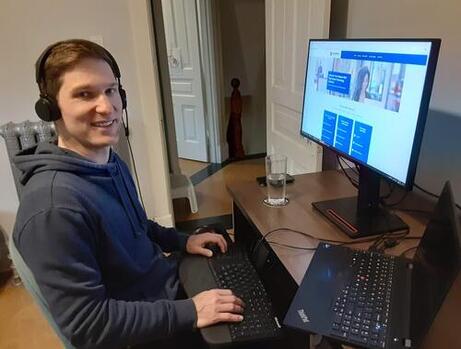 With PeaceWorks, I’ve had the privilege of working with nonprofits and charities to help them advance their mission. We work with organizations directly impacting the reach of food banks, affordable housing, international economic development, local food production and distribution, human rights advocacy groups, and much more. The first step is always to get to know the organization we’re working with, to understand their goals and pain points. We then use our technical skills to create a solution that fits within their budget and addresses their needs. Along the way, I get to form relationships with people working at organizations doing great work. I get to be involved in projects where everyone has a role to play, each person using their unique skills to contribute to a common goal.
With PeaceWorks, I’ve had the privilege of working with nonprofits and charities to help them advance their mission. We work with organizations directly impacting the reach of food banks, affordable housing, international economic development, local food production and distribution, human rights advocacy groups, and much more. The first step is always to get to know the organization we’re working with, to understand their goals and pain points. We then use our technical skills to create a solution that fits within their budget and addresses their needs. Along the way, I get to form relationships with people working at organizations doing great work. I get to be involved in projects where everyone has a role to play, each person using their unique skills to contribute to a common goal.
I’ve been supported and challenged by my coworkers and my clients. There were always people who believed in me when I was still rough around the edges—people who saw me not just for the person I was, but the person I was becoming. This has kept me motivated and driven to continue the work. Due to the limited budgets of some of our clients, my team and I look for new and innovative ways to achieve results with less resources. It motivates me, knowing I’m working for an organization that is purpose-driven more than it is profit-driven. I have had opportunities to not only use my software skills, but also to sit on the board of directors, drive sub-committees, and manage a team of web developers. As a worker-owner, I’m also able to impact the direction and goals of the company.
My years at Grebel were formative in preparing me for this path. At Grebel, I learned how to relate to different types of people and what it feels like to belong to something larger than myself.
MARTIN EDMONDS (BMATH 1987)
Weaver and Supporter of Technologies, The Working Centre, Kitchener, ON
I work as part of a team, supporting technology at a non-profit, The Working Centre, in downtown Kitchener. In our work, basic technologies provide most benefit: communication tools for outreach workers who support people in our shelters and living on the street, key fobs for our low income low barrier housing, public VoIP phones and voicemail service, internet access, security cameras, monitoring of fridges and solar panels, file servers, software for our health and dental clinics, and recycling of computer equipment to make it available to people who would not otherwise be able to afford it.
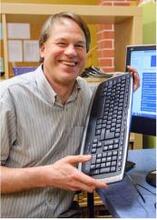 My involvement in this work has connected me with people from all walks of life: generous donors, volunteers, and people who are struggling with loneliness, job loss, homelessness, and addiction. This connection with people has challenged me to think about when to apply technology to solve a problem. Is access to the technology and its benefits fairly distributed, or does it leave some people disenfranchised? Does the technology make work more meaningful, or does it take away someone’s work and opportunity to make a valuable contribution? Will the technology build community, or leave people more isolated? As people inclined and trained in technology, we play an important role in leveraging technology, but we also bear the responsibility of assessing whether, when, and how it should be applied. The answers are never clear-cut, but they help to guide me in my work.
My involvement in this work has connected me with people from all walks of life: generous donors, volunteers, and people who are struggling with loneliness, job loss, homelessness, and addiction. This connection with people has challenged me to think about when to apply technology to solve a problem. Is access to the technology and its benefits fairly distributed, or does it leave some people disenfranchised? Does the technology make work more meaningful, or does it take away someone’s work and opportunity to make a valuable contribution? Will the technology build community, or leave people more isolated? As people inclined and trained in technology, we play an important role in leveraging technology, but we also bear the responsibility of assessing whether, when, and how it should be applied. The answers are never clear-cut, but they help to guide me in my work.
Discussion and reflection at Grebel has been significant in forming my values. At Grebel, I developed my primary network of friendships that have continued to provide me with inspiration, support, and accountability.
DR. MADELAINE LIDDY (BASC 2014, PHD 2022)
Quantum Sensing Resident, SandboxAQ, Palo Alto, CA
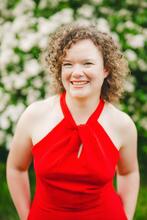 My work has taken me to focus on quantum sensors. Counter to classical sensors, we can extend the sensitivity and applications to more sophisticated devices, building better sensors to improve navigation, communication, and medical devices. Every day I am challenged in a new way to push the boundaries of what is possible with technological devices.
My work has taken me to focus on quantum sensors. Counter to classical sensors, we can extend the sensitivity and applications to more sophisticated devices, building better sensors to improve navigation, communication, and medical devices. Every day I am challenged in a new way to push the boundaries of what is possible with technological devices.
I love to think of new ways to create devices and it helps my personal motivation knowing that these devices may be used to better the world and help people.
Having a music degree reshaped the way I think about things, and when you pair engineering and music together, you are encouraged to expand your approach to problem solving. I found that music and engineering massively complemented each other. Approaching music with a technical mindset let me break down the pieces I was studying into the smallest increments and then build it back up again. And using music to approach an engineering problem made me a lot more creative in my problem-solving because it eliminated boundaries beyond just thinking technically and what had been done before.
LEENA MILLER CRESSMAN
(BA 2010)
Owner/Director, The Branches, Kitchener-Waterloo, ON
EMMA DINES
(BIS 2011)
Creative Director, The Branches, Kitchener-Waterloo, ON
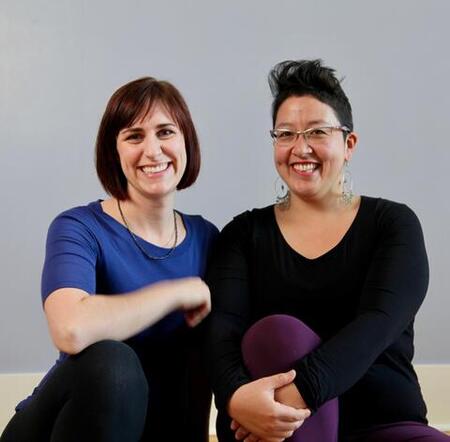 Our yoga studio, The Branches, has been teaching yoga and meditation classes for years, and when the pandemic began, we shifted to offering our classes and courses online. We have maintained our online offerings even though we are now permitted to gather in-person again, and we feel that this offers an important aspect of accessibility to our community. We have also created an online library of classes that members can stream at any time. Many of our offerings centre on caring for our mental health and positive body image/body positivity, so we are glad to be able to nudge the culture and reach more people with our online offerings.
Our yoga studio, The Branches, has been teaching yoga and meditation classes for years, and when the pandemic began, we shifted to offering our classes and courses online. We have maintained our online offerings even though we are now permitted to gather in-person again, and we feel that this offers an important aspect of accessibility to our community. We have also created an online library of classes that members can stream at any time. Many of our offerings centre on caring for our mental health and positive body image/body positivity, so we are glad to be able to nudge the culture and reach more people with our online offerings.
It was definitely challenging to hit the ground running at the start of the pandemic and try to quickly learn how to offer our classes in this way. We had to learn a lot about microphones, video quality, lighting, and how to interact with people in a yoga class online. We received a lot of feedback from our yoga students early in the pandemic that our online classes were a lifeline of connection for many of them—that attending our yoga classes amidst so much uncertainty in the pandemic was really helpful. We are so glad that we were able to offer that to our students and we know we can reach more people by continuing to offer our classes and programs with online options.
It was definitely a community effort to get our online offerings going—we reached out to our community for help, and people with technological expertise offered a lot of time and advice to help us get going. Our yoga studio has always been supported by the community around it, and Grebel definitely was part of inspiring our values in this direction.
LISA SCHIRCH (BA 1990)
Professor of the Practice of Technology and Peacebuilding, Richard G. Starmann Sr. Endowed Chair in Peace Studies, Kroc Institute for International Peace Studies, Keough School of Global Affairs, University of Notre Dame, Notre Dame, IN
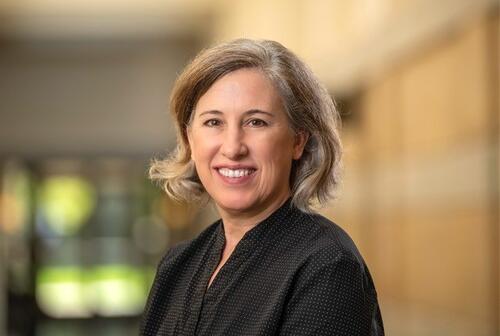 At the University of Notre Dame, I direct the PeaceTech and Polarization Lab where I work with colleagues and students to design and develop tech products that foster justice, reduce digital hate and disinformation, and foster social cohesion that people can participate in developing creative solutions to challenging problems. I teach a course on Digital Peacebuilding and Peacetech that explores the various roles tech can play in bridge-building dialogue, advocacy and social movement, human rights documentation, and democratic decision-making.
At the University of Notre Dame, I direct the PeaceTech and Polarization Lab where I work with colleagues and students to design and develop tech products that foster justice, reduce digital hate and disinformation, and foster social cohesion that people can participate in developing creative solutions to challenging problems. I teach a course on Digital Peacebuilding and Peacetech that explores the various roles tech can play in bridge-building dialogue, advocacy and social movement, human rights documentation, and democratic decision-making.
There are powerful forces using technology to further divide people and stymie efforts to come together to solve problems. Those of us working for peace and justice are looking for ways to amplify and scale our impacts. There are new tech platforms that are designed for improving healthy relationships and collective decision making; platforms that intentionally make it easier for people to solve problems and harder for people to attack each other. The future of peacebuilding and democracy requires us to work together to scale the use of such platforms.
I bring Anabaptist ethics and peacebuilding processes I first learned at Grebel to the tech design process.
DONNY CHEUNG (BMATH 2001, MMATH 2003, PHD 2007)
Technical Lead Manager, Google Canada, Toronto, ON
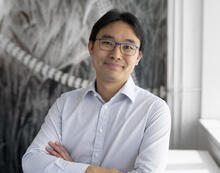 I am incredibly grateful that my career has provided me with opportunities to work on various healthcare technologies. I currently lead the software development team responsible for AIpowered healthcare data services offered through Google Cloud. My hope is that these technologies will ultimately allow care providers to make better-informed decisions by providing a deeper understanding of a patient’s health, history, and care journey.
I am incredibly grateful that my career has provided me with opportunities to work on various healthcare technologies. I currently lead the software development team responsible for AIpowered healthcare data services offered through Google Cloud. My hope is that these technologies will ultimately allow care providers to make better-informed decisions by providing a deeper understanding of a patient’s health, history, and care journey.
In my work, I’ve been able to meet and exchange ideas with some truly incredible and inspirational thinkers and doers about the challenges and opportunities facing datadriven healthcare today. So much of our notion of justice is grounded in our ability or inability to collectively tend to our health needs and the needs of those dear to us. The arrival of our child Teo last year has also re-energized my passion to contribute in some small way to making progress on one of society’s toughest long-term challenges.
Encounters during my time at Grebel taught me to approach the toughest technical and organizational problems from a place of compassion and justice first, and then from a place of intellectual curiosity. These lessons have helped me to focus on the work that I believe can have the widest impact on the common good.
JOSEPH TAFESE (BSE 2022)
PhD Candidate, Unversity of Waterloo, Waterloo, ON
My PhD research is focused on developing tools that help engineers mathematically prove that the software they write, or circuits they create, are correct. This is particularly useful for technologies such as cancer radiation therapy machines, simulation software, commercial aeroplanes, etc. My PhD focuses on the formal verification of software systems, specifically where we can do so in an automated fashion. I find this field particularly interesting because of the ubiquity of technology in our society and the value that can be added to the lives of people at a global scale. Prior to my PhD, I helped run the engineering team of a software-as-a-service start-up, ESGTree, that works out of the Grebel Peace Incubator.
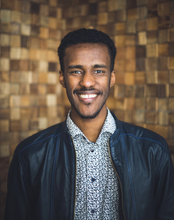 Striving for excellence has been a huge goal in my life. Excellence, not only for my individual contributions, but also in the way that I lead. This came in the form of humility and creativity at ESGTree, and it takes the form of resilience and proactivity in my research. I am reminded of the Prophet Daniel from the Old Testament who “became distinguished above all the other high officials and satraps, because an excellent spirit was in him” (Daniel 6:3 ESV) during his exile in Babylon. Since graduating, there are two domains in which I hoped to be excellent—not out of some grandiose need to be praised but to serve in a meaningful way.
Striving for excellence has been a huge goal in my life. Excellence, not only for my individual contributions, but also in the way that I lead. This came in the form of humility and creativity at ESGTree, and it takes the form of resilience and proactivity in my research. I am reminded of the Prophet Daniel from the Old Testament who “became distinguished above all the other high officials and satraps, because an excellent spirit was in him” (Daniel 6:3 ESV) during his exile in Babylon. Since graduating, there are two domains in which I hoped to be excellent—not out of some grandiose need to be praised but to serve in a meaningful way.
At ESGTree, an early-stage start-up, we needed to make sure that our resources—finances, time, and relationships—were used sustainably. With tight timelines, we had to invest in projects that would help us acquire customers and grow the business. But it was crucial to ensure that the relationships we had fostered within the company, and our partners, were treated with a long-term view as well. It’s not often that this combination of values are top of mind for engineering leaders in tech start-ups but, like Daniel, it was crucial to our success to be found faithful and excellent.
My PhD is a seemingly different endeavour with surprising overlaps. Like a start-up, it is important to be creative about what problems you work on and how they can be of value to society. To this end, there is tremendous value in persisting through the highs and lows— whether that be failed projects to learn from or projects that inspire co-creation. Furthermore, it is crucial that the contributions adhere to the highest standards of integrity, both academic and moral.
Looking at where my life has gone through the lens of Daniel’s life in exile gives me great hope—even when the situations look bleak, we strive for excellence because we serve an excellent God.
Grebel makes room for a thinking engineer. This comes through diverse opinions on society, impact courses, and relationships that have influenced how and what I work on. It’s been good to see how a couple of years can transform my concept of engineering.
DR. MAXWELL KENNEL (BA 2013, MTS 2015, TMTC 2021)
Director of Pandora Press, SSHRC Postdoctoral Fellow, University of Toronto, Thunder Bay, ON
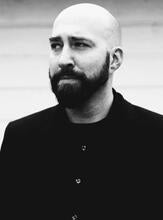 Making the world a better place through technology is a complicated idea, and complexity is difficult to capture on screens or within the character limits of social media posts. In my work as director of Pandora Press, I use a variety of technological advances in printing and publishing to promote challenging and thought-provoking books in and around the area of Mennonite Studies. New printon-demand technologies have allowed me to bring nearly all Pandora Press books back into print, making available over 100 titles that range from Anabaptist history and Mennonite Theology, to dialogues between religion and science. Pandora Press’s recent philosophical novel—Ronald Tiessen’s Menno in Athens—is the first ebook released by the press, and it was recently applauded by Margaret Atwood on Twitter.
Making the world a better place through technology is a complicated idea, and complexity is difficult to capture on screens or within the character limits of social media posts. In my work as director of Pandora Press, I use a variety of technological advances in printing and publishing to promote challenging and thought-provoking books in and around the area of Mennonite Studies. New printon-demand technologies have allowed me to bring nearly all Pandora Press books back into print, making available over 100 titles that range from Anabaptist history and Mennonite Theology, to dialogues between religion and science. Pandora Press’s recent philosophical novel—Ronald Tiessen’s Menno in Athens—is the first ebook released by the press, and it was recently applauded by Margaret Atwood on Twitter.
In the world of images, the new Pandora Press logo—designed by Jonathan Dyck—gives the press an image that feels both old and new. Technological advances in optical character recognition (OCR) have also made it more expedient to edit archival materials and typescripts, such as the forthcoming edition of C.J. Dyck’s dissertation on the Dutch Anabaptist Hans de Ries. As well, technologies as common as a video chat allow me to stay in touch with fellow publishers at CMU Press and the Institute of Mennonite Studies at AMBS, and journals like the Mennonite Quarterly Review and The Conrad Grebel Review.
Seeking out, reviewing, editing, typesetting, and publishing creative and scholarly work in Mennonite Studies has been so enriching because it allows me to give voice to ideas and issues that matter. Working with authors is inspiring and challenging, and seeing a project through from idea to publication is a very gratifying experience that uses technology—from the pen to the printer— for good causes, whether that’s the good of creativity or the cause of social justice.
My time at Grebel in the MTS program inspired much of my work with Pandora Press, especially as I discovered the hidden treasure trove of neglected, unpublished, and rare works by and about Mennonites. Finding Edgar Metzler’s brilliant 1968 pamphlet on extremism in the TMTC library, and learning about a German biography of Anabaptist figure Hans Hut in a course with Arnold Snyder, both showed me a fascinating hidden world of Mennonite publications that I can now make public through the Pandora Press platform: www.pandorapress.com
COLE ATLIN (BES 2010, PHD 2019)
Impact Assessment Specialist, Calian Nuclear Adjunct Professor, University of Waterloo, Waterloo, ON
I work as the Impact Assessment Specialist for Calian Nuclear. We are involved in supporting numerous new nuclear projects across Canada in various industries such as clean energy production, medical isotopes and even emergency response. Besides providing cheap and reliable carbon-free base load power, new nuclear technologies such as small modular reactors provide a feasible solution for remote communities to justly transition off fossil fuels and towards energy independence.
Remote communities in Canada currently consume 90 million litres of diesel fuel a year for electricity generation. Not to mention that transporting diesel to remote locations often provides its own challenges, so the promise of new nuclear technologies would be a total game-changer that would absolutely transform these societies by ending energy poverty with the added benefit of being carbon emissions free. I support the assessment of these new projects, including designing assessment processes, supporting Indigenous engagement and consultation, and developing public engagement approaches. In so doing, I help move these new projects from an engineering drawing to an actual project.
 I have worked in assessment for 12 years and completed my PhD in Social and Ecological Sustainability from Waterloo in 2019, focusing on conflict and impact assessment in extractive industries, particularly as it relates to Indigenous and settler conflict. I had my son in 2020 and I was starting to feel that my work was not going to assist significantly in improving his future. Calian came to me with this opportunity, and it felt right. Nuclear is a seemingly obvious path forward that can move the needle on climate change in a major way. However, it does not come without its challenges—particularly in building social license and public stakeholder support. Despite nuclear being among the safest industries in the world, with far fewer associated deaths per unit of energy than any other kind, incidents like Chernobyl and Fukushima provide major setbacks in garnering public support.
I have worked in assessment for 12 years and completed my PhD in Social and Ecological Sustainability from Waterloo in 2019, focusing on conflict and impact assessment in extractive industries, particularly as it relates to Indigenous and settler conflict. I had my son in 2020 and I was starting to feel that my work was not going to assist significantly in improving his future. Calian came to me with this opportunity, and it felt right. Nuclear is a seemingly obvious path forward that can move the needle on climate change in a major way. However, it does not come without its challenges—particularly in building social license and public stakeholder support. Despite nuclear being among the safest industries in the world, with far fewer associated deaths per unit of energy than any other kind, incidents like Chernobyl and Fukushima provide major setbacks in garnering public support.
Because of such incidents, it’s not surprising that there hasn’t been a new nuclear facility built in Canada in over 50 years, even though statistically the data speaks for itself. There are also challenges moving forward to make sure that we’re doing a good job and that we are engaging people in this technological revolution in a meaningful way. My expertise can lend a lot of value to these conversations and to this important work. The challenges are big but the rewards are significant, particularly for the next generation.
Grebel gave me skills in looking at conflict and breaking it down into useful components. I think that conflict is generally perceived as destructive. But it can be constructive and assist in developing pathways to better futures. Conflict helps identify how decisions should be made, what information needs to be part of good decisions, where information gaps and misinformation exist, and how effective engagement and assessment should manage conflict, not avoid or squelch it. The conflict surrounding nuclear development is often immense and overwhelming. Grebel inspired me to disentangle this conflict and map it for the problem. One of the most pressing potential applications for the skills that Grebel taught me is to further nuclear development in Canada to assist in overall decarbonization.






